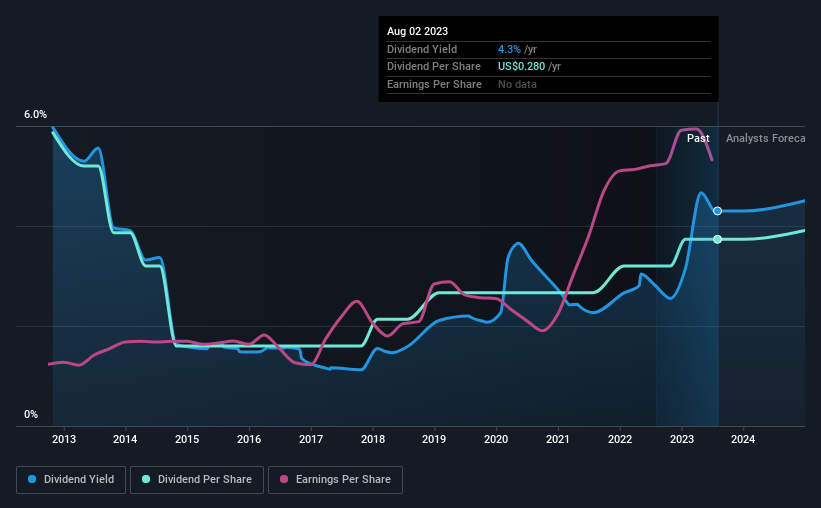Is It Smart To Buy Western New England Bancorp, Inc. (NASDAQ:WNEB) Before It Goes Ex-Dividend?
Some investors rely on dividends for growing their wealth, and if you're one of those dividend sleuths, you might be intrigued to know that Western New England Bancorp, Inc. (NASDAQ:WNEB) is about to go ex-dividend in just four days. Typically, the ex-dividend date is one business day before the record date which is the date on which a company determines the shareholders eligible to receive a dividend. The ex-dividend date is of consequence because whenever a stock is bought or sold, the trade takes at least two business day to settle. Meaning, you will need to purchase Western New England Bancorp's shares before the 8th of August to receive the dividend, which will be paid on the 23rd of August.
The company's next dividend payment will be US$0.07 per share, on the back of last year when the company paid a total of US$0.28 to shareholders. Looking at the last 12 months of distributions, Western New England Bancorp has a trailing yield of approximately 4.3% on its current stock price of $6.51. If you buy this business for its dividend, you should have an idea of whether Western New England Bancorp's dividend is reliable and sustainable. So we need to investigate whether Western New England Bancorp can afford its dividend, and if the dividend could grow.
View our latest analysis for Western New England Bancorp
If a company pays out more in dividends than it earned, then the dividend might become unsustainable - hardly an ideal situation. Fortunately Western New England Bancorp's payout ratio is modest, at just 25% of profit.
Generally speaking, the lower a company's payout ratios, the more resilient its dividend usually is.
Click here to see the company's payout ratio, plus analyst estimates of its future dividends.
Have Earnings And Dividends Been Growing?
Companies with consistently growing earnings per share generally make the best dividend stocks, as they usually find it easier to grow dividends per share. If earnings fall far enough, the company could be forced to cut its dividend. That's why it's comforting to see Western New England Bancorp's earnings have been skyrocketing, up 20% per annum for the past five years.
Many investors will assess a company's dividend performance by evaluating how much the dividend payments have changed over time. Western New England Bancorp has seen its dividend decline 4.4% per annum on average over the past 10 years, which is not great to see. It's unusual to see earnings per share increasing at the same time as dividends per share have been in decline. We'd hope it's because the company is reinvesting heavily in its business, but it could also suggest business is lumpy.
To Sum It Up
Has Western New England Bancorp got what it takes to maintain its dividend payments? When companies are growing rapidly and retaining a majority of the profits within the business, it's usually a sign that reinvesting earnings creates more value than paying dividends to shareholders. This strategy can add significant value to shareholders over the long term - as long as it's done without issuing too many new shares. In summary, Western New England Bancorp appears to have some promise as a dividend stock, and we'd suggest taking a closer look at it.
With that in mind, a critical part of thorough stock research is being aware of any risks that stock currently faces. To help with this, we've discovered 2 warning signs for Western New England Bancorp (1 doesn't sit too well with us!) that you ought to be aware of before buying the shares.
Generally, we wouldn't recommend just buying the first dividend stock you see. Here's a curated list of interesting stocks that are strong dividend payers.
Have feedback on this article? Concerned about the content? Get in touch with us directly. Alternatively, email editorial-team (at) simplywallst.com.
This article by Simply Wall St is general in nature. We provide commentary based on historical data and analyst forecasts only using an unbiased methodology and our articles are not intended to be financial advice. It does not constitute a recommendation to buy or sell any stock, and does not take account of your objectives, or your financial situation. We aim to bring you long-term focused analysis driven by fundamental data. Note that our analysis may not factor in the latest price-sensitive company announcements or qualitative material. Simply Wall St has no position in any stocks mentioned.

